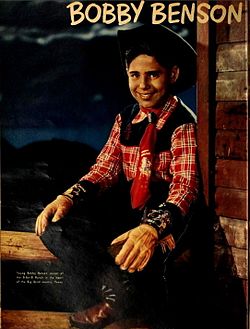Bobby Benson and the B-Bar-B Riders

Bobby Benson as portrayed in Radio TV Mirror magazine's August 1950 issue. The actor was not identified.
|
|
| Other names |
Bobby Benson's Adventures The H-Bar-O Rangers B-Bar-B Ranch B-Bar-B Songs Bobby Benson and Sunny Jim |
|---|---|
| Genre | Juvenile Western adventure |
| Running time | 15 minutes (1932-1936) 30 minutes (1949-1955) |
| Country of origin | United States |
| Language(s) | English |
| Home station | WGR |
| Syndicates |
CBS Mutual |
| Starring | Richard Wanamaker (1932-1933) Billy Halop (1933 - 1936) Ivan Cury (1949-1950) Clyde Campbell (1951-1955) |
| Announcer |
Dan Seymour André Baruch Art Millet Bob Emerick Bucky Cosgrove Carl Warren |
| Created by | Herbert C. Rice |
| Written by | Peter Dixon John Battle Jim Shean |
| Directed by | Bob Novak |
| Original release | October 17, 1932 – June 17, 1955 |
| Opening theme | "Westward Ho" |
| Sponsored by | Hecker H-O Company Kraft Foods |
Bobby Benson and the B-Bar-B Riders is an old-time radio juvenile Western adventure program in the United States, one of the first juvenile radio programs. It was broadcast on CBS October 17, 1932 - December 11, 1936, and on Mutual June 21, 1949 - June 17, 1955.
Bobby Benson was created by Herbert C. Rice, who had already originated "dozens of local drama series" as a director at a radio station in Buffalo, New York. In 1932, representatives of the Hecker H-O Company of Buffalo sought to develop a children's radio program for the company's cereal products. Rice associated the "H-O" name with a cattle brand and soon developed a concept about an orphan named Bobby Benson and his guardian, Sunny Jim (an icon used to represent H-O cereals). The program was called The H-Bar-O Rangers while it was sponsored by Hecker.
After his parents' deaths, 12-year-old Bobby Benson inherited the B-Bar-B Ranch in Big Bend, Texas. That development paved the way for adventures as, week after week, outlaws and other bad people tried to cause problems for the ranch and its people. Young Bobby was helped by Tex Mason, his foreman. Jim Cox, in his book Radio Crime Fighters: More Than 300 Programs from the Golden Age, described the program as
capturing the imagination of little tykes and older adolescents as Bobby and his ranch hands stumbled upon exploits well beyond an ordinary youngster's reach. Most of Benson's escapades involved the pursuit and capture of contingents of bandits and desperadoes of diverse sorts. Rustlers, smugglers, bank and stagecoach robbers dotted the scripts like cactus spread across the Western plains.
Relief from the show's drama and suspense came in the form of songs sung around a campfire and humorous tall tales told by handyman Windy Wales. In a column in the May 15, 1938, issue of the trade publication Broadcasting, writer Pete Dixon noted that inclusion of comedy segments boosted the show's popularity: "Bobby Benson & the H-Bar-O Rangers was just another juvenile western until ... comedy characters were introduced in the script. Comedy situations were alternated with melodrama. Within a year the Bobby Benson show jumped from tenth place among juvenile favorites to first place. Comedy accounted for the climb."
In 1949, a reviewer for the trade publication Billboard wrote, "Kids still go for good old-fashioned Western adventure, and this show is loaded with fast action and fancy gun play, yet wholesome enough to please the most exacting parent."
...
Wikipedia
